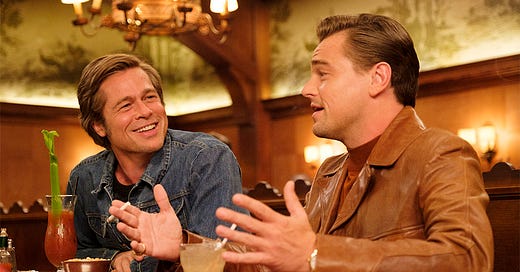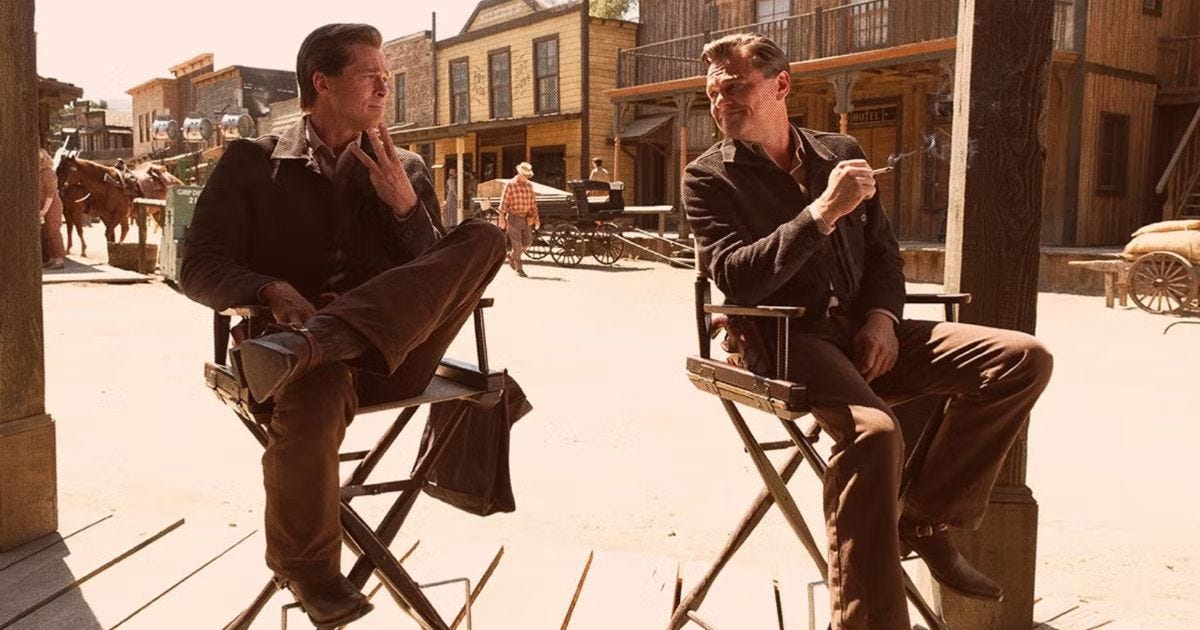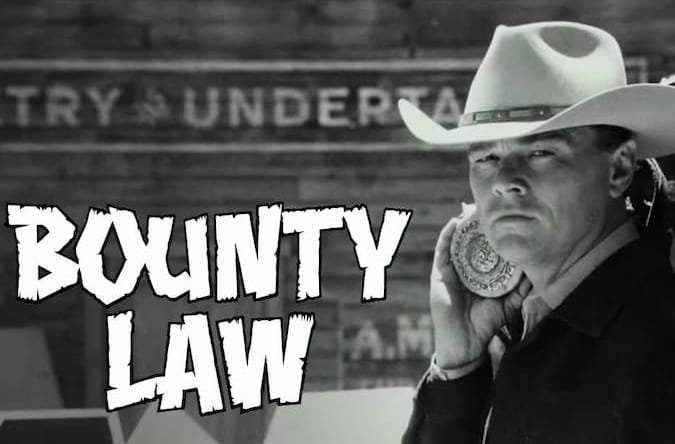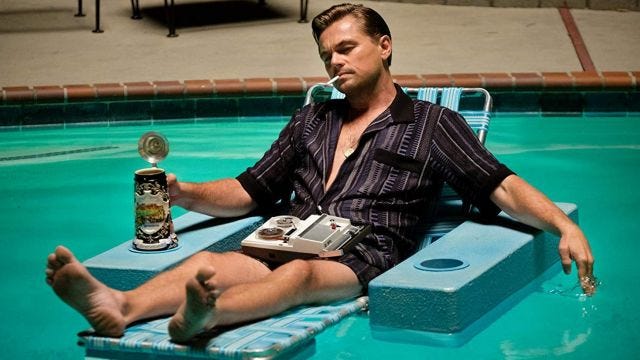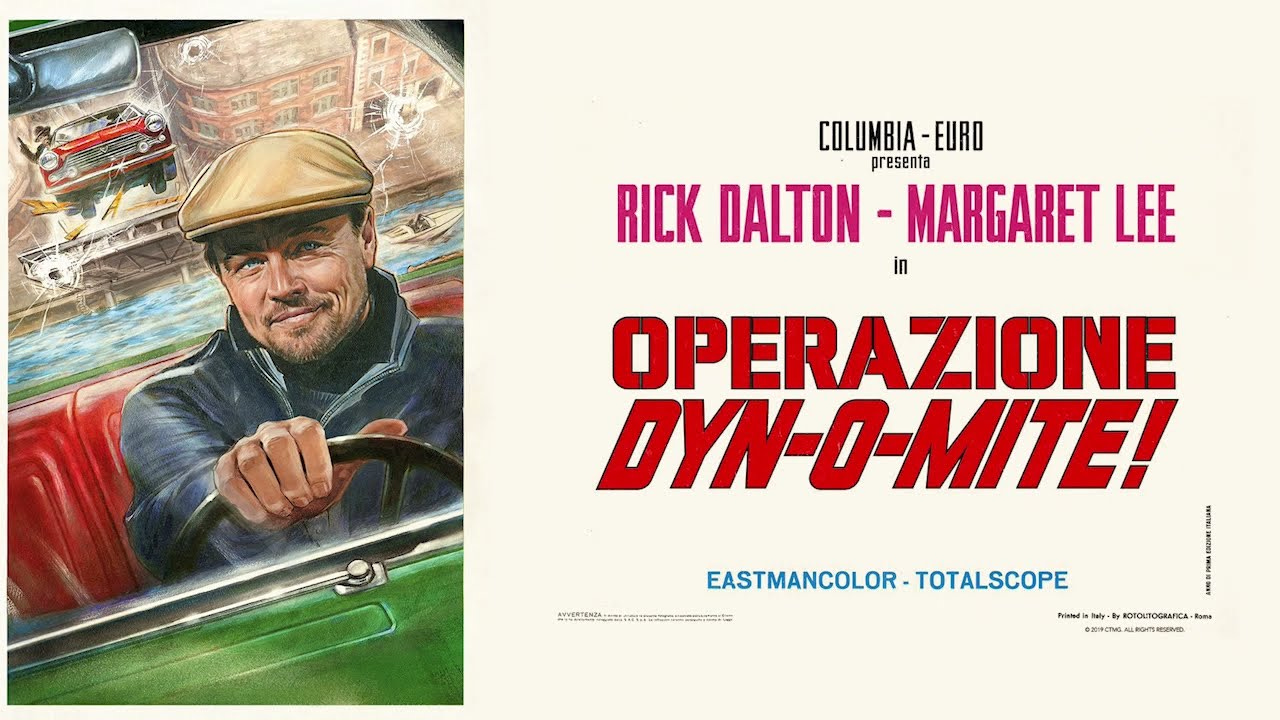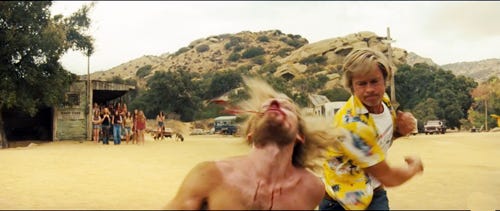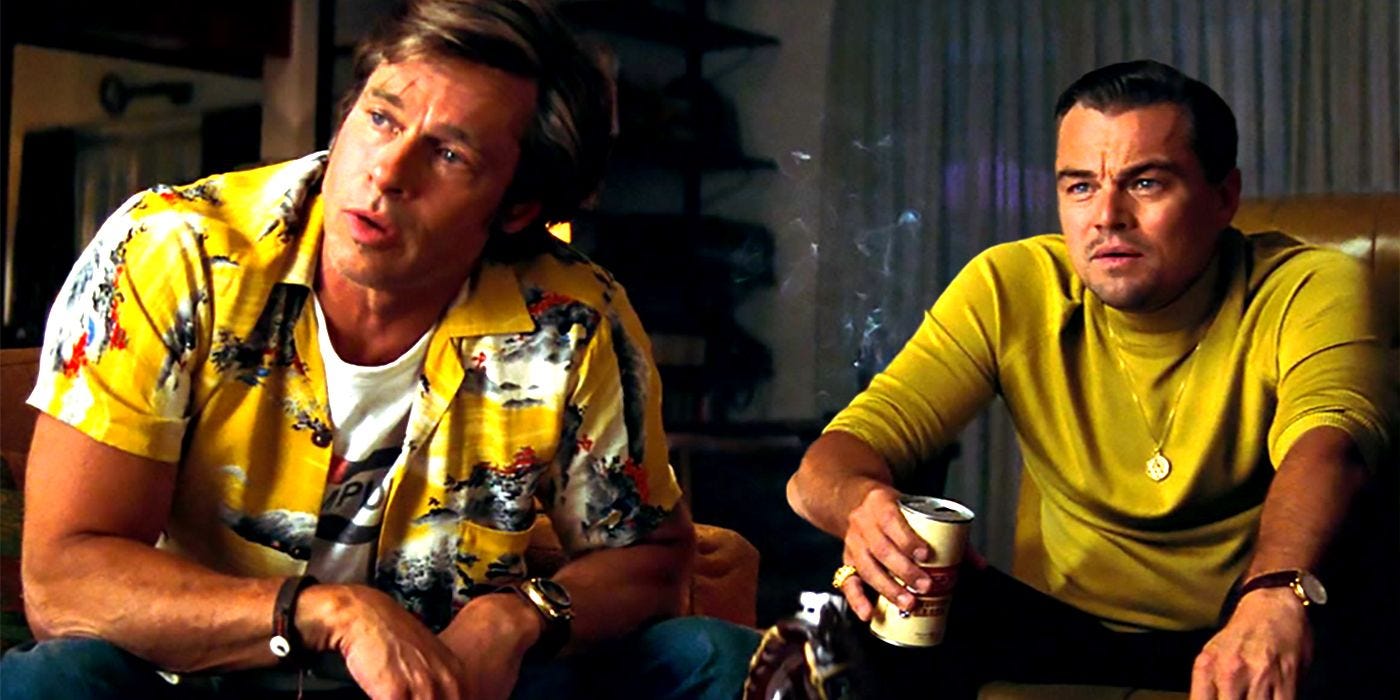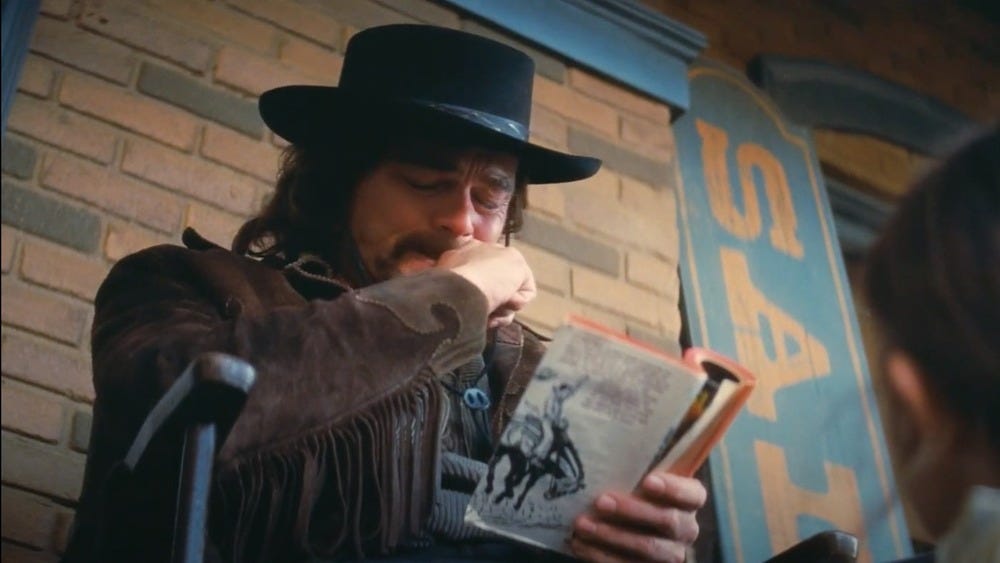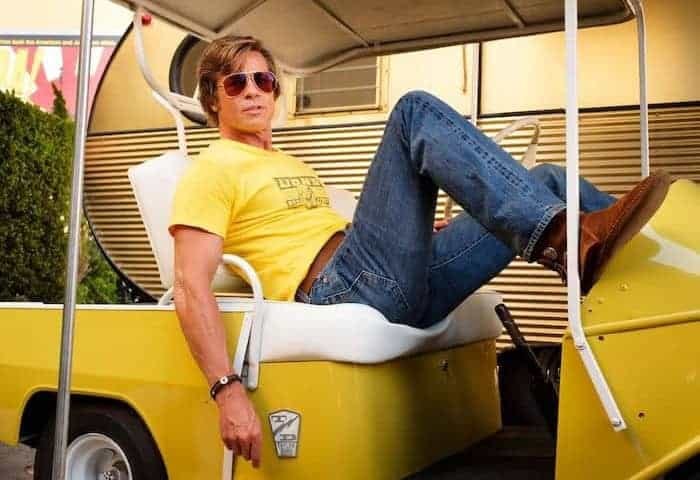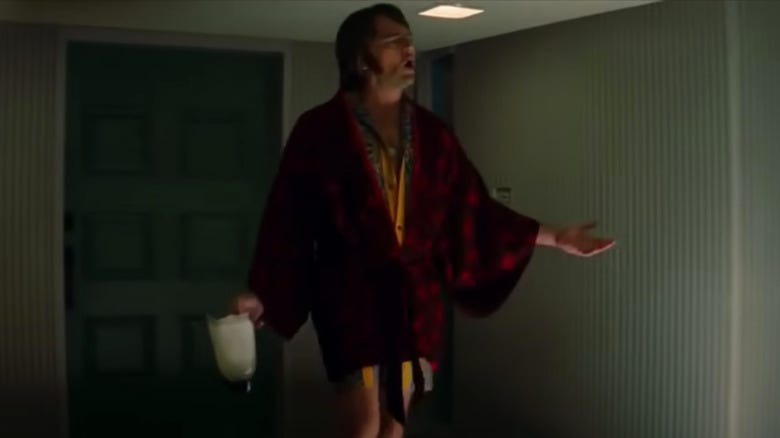Tarantino's Character Genius: Rick Dalton and Cliff Booth
10 Ways Tarantino Creates the Best Characters
A few nights ago, as I was re-watching Once Upon a Time in Hollywood, I just wondered: Why are Quentin Tarantino’s characters so much better than anyone else’s?
I think I narrowed it down to two main reasons. Each reason inherently contradictory, a tightrope wire he masterfully walks.
Authenticity vs. Larger than Life: The characters simultaneously appear authentic and believably grounded, while also being larger than life. They speak like real people, yet they’re far more eloquent.
Humor vs. Farce: His characters are some of the funniest in cinema, but they never become slapstick or ironic or stupid. The jokes and wildness should feel out of place and zany, but they never do.
It begs the question, how does he pull this off? Why are his characters far and away more entertaining, quotable, and memorable than any others?
To understand, I dove into the lives of Rick Dalton and Cliff Booth to understand the genius of his writing. In doing so, I established 10 specific aspects of Tarantino’s characters that set them apart from any I have ever seen:
INTRODUCTIONS
In the opening scene, we see an interview with Rick and Cliff where Rick, in his 50’s pompadour, answers like a TV cowboy, a buttoned up show-lead at the height of his fame. And Cliff, when asked as his stunt-double if he carries Rick’s load, says yeah, that’s about right.
Rick is a poised, stuttering actor playing the cool, measured role. And Cliff comes across as almost his bitch, comfortable in his role as second fiddle. It’s a humorous duo that seems like great friends. They’re singular, unique.
PASTS
With Quentin’s movies, there’s always the feeling that the characters have lived full, interesting lives before the movie begins. Why? Because he has actually written out their stories.
Rick, years later, contends with his declining career after his show ended. He and Marvin Schwarz, his agent, talk through Rick’s filmography with the 14 Fists of McCluskey, Tanner, and an episode of Bounty Law. Rick opens up about his struggle to find work. He has worked as a guest-star in others’ shows, playing the villain who gets killed. He fears that exposure is affecting how the audience perceives him.
Cliff’s past is guarded with mystique as other characters debate whether or not he killed his wife. But if we know anything about him, we know he is a war hero, he can beat the shit out of Bruce Lee, and he’s not afraid to resort to violence.
PRESENTS
After Polanski and Sharon Tate move in next door, Rick espouses the importance of buying a house in the Hills when one starts making money. His environment is one of wealth, posters of his past glory, but also a creeping alcoholism. The weight of the past is weighing on him, and he drinks away his worries as he’s preparing for his roles.
Cliff lives on the back lot of a movie set in a trailer. After seeing him drive wildly yet masterfully, we see everything we need to know about him in his little abode: his convertible, a bench press, his well-trained Pitbull, his beer, his comic books, and his posters of women. He’s just a chill dude with violent past.
FUTURES
Tarantino’s characters often worry about their futures. They have choices. Rick must decide between puttering around playing the shitty roles on TV and going to Italy to star in spaghetti westerns. Either way, he feels he is on the downturn of his career. There is an internal conflict. Cliff worries the same way about finding odd stunting jobs, though he has not nearly the anxiety of his buddy.
CONTRADICTIONS
Here is the true genius of Tarantino. His characters are always multidimensional and conflicting. Rick is a whiny, emotional, worrying actor, yet he truly practices his lines and wishes to be great. And in his scene as Caleb, he actually stuns the whole set with his performance, earning him enough validation to make him cry. Despite his comedic worries, he is actually competent. He is a great actor.
Cliff appears to be the most laid-back, easy-going character in the history of cinema, yet he’s also the most dangerous. He never seeks trouble, he never boasts, yet when it arises, he’s there to strike it down. He completely assured of his deadly capabilities, ready to use them to their full extent whenever he must (his wife, the tire-changing scene, the ending of course).
DOWN TIME
We see these characters alone after they’ve dropped the facade. There’s a conflict in regular people where we present as one thing, yet when we’re alone, we’re completely different. Rick, despite his politeness, has an ego. He has an extreme self-loathing and bad habits, yet he shows the world his 50’s Bounty Law Rick Dalton face.
Cliff shows his authenticity with his downtime, as there’s not much discrepancy between his personas. He never tries to be cool or do too much, he simply is. He’s the same fun-loving dude at home as he is with Rick. And together, when they’re just hanging watching Rick’s performances over a few beers, they’re each shown as good supportive friends who can shoot the shit and have a good time. They’re each extremely thankful for the other.
INTERESTS
People’s interests say a lot about them. Thus, the more specific the interests, the more they’re characterized. Rick, being a southern boy, listens to country music. He drinks whiskey sours predominantly. He reads cowboy novels. Everything he does is yearning for that earlier time, a time he thinks is lost.
Cliff is always existing in the moment. He drinks contemporary beer, he’s into comic books, he likes working out, he’s a handyman, he likes women. He’s a dude who doesn’t worry too much and just has a good time.
OPINIONS
Real people are opinionated. Rick, as they drive down Hollywood hippies, shouts his hate for the hippies and the modern era. Cliff, on the other hand, simply laughs and praises Rick during his shoots, showing he’s yet again that contented guy.
STYLE
For the most part, you can tell almost everything about somebody by how they dress. Rick’s clothing shows his wealth, yet his pompadour mixed with his stylish 60’s clothes create a conflict in his identity with his persona. Cliff, on the other hand, wears jeans and a t-shirt throughout the entire movie, with leather moccasins. One is trying to fit in, the other is just cool.
HUMOR
The main reason the humor in Tarantino’s movie never borders on farce is because it is undeniably true to the character. Each character, like real humans, is trying to be funny. They amuse themselves, they say irreverent things. Rick’s emotional outburst is humorous because he is that self-hating, emotional guy throwing tantrums. He is out of place in his hippie costume, juxtaposing his hate against his role. And when he runs out in his robe drunk on margaritas screaming at the hippies, it’s hilarious because it’s authentically who he is.
Cliff joking with the hippie girl comes out of a man smooth with women. When one hippie says (referring to her friend Pussycat) we love pussy, Cliff responds yes we do. It’s funny because it’s true. And his entertaining acid trip at the end is so funny because it’s legitimately the words of a man on an acid trip, wondering if the murderers are real or part of his imagination.
Ultimately, the genius lies in the creation of absurd, larger-than-life characters, while establishing those hard bounds and never diverging. The characters, despite being wild and interesting, are never inconsistent. Every aspect of their lives is accounted for, and every aspect of their psychology is on display. The contradictions exist within the characters as personal battles, not in their actions or dialogue. We know what they like, what they hate, what they do, where they’ve been, where they’re going, what they’re good at, and who they are. They’re staunchly who they are and they’re exceptionally unique.
And because of that, Tarantino continues to create the most entertaining, enigmatic, humorous characters that have ever graced the screen.
